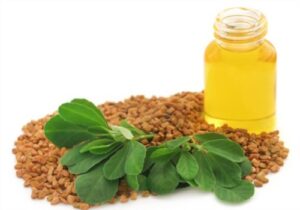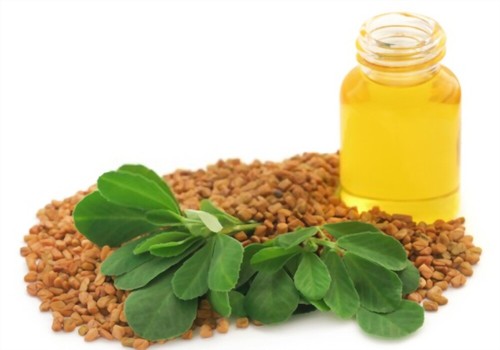Fenugreek has a long history as a medicinal plant. Ancient documents tell us that it was used in Ancient Egypt as part of the embalming process and to induce childbirth and stimulate lactation.
Today it is still a vital supplement within the flour used for bread making, and is used to alleviate menstrual pain in women. In Ancient Rome it was used to induce childbirth, and in India to increase lactation, where it is still used for this purpose today.
It is an important ingredient as a spice (dried seeds) and herb (dried leaves) in India, incorporated into curries and chutneys, whilst its fresh leaves are used in salads. The bittersweet flavour, reminiscent of maple syrup and burnt sugar, marks its use as an ingredient for desserts, and as the main flavouring for artificial maple syrup. Known as helba in Northern Africa, and methi in India, it’s the therapeutic properties it contains that make fenugreek oil so precious.

Fenugreek oil is obtained from the seeds by way of cold-pressed extraction, thus retaining all of the nutrients and properties in a concentrated oil. It contains vitamins A, C, E, and group B, plus folic acid, a complex of macro and microelements including iron, selenium, copper, magnesium, potassium, calcium, zinc, iodine, fluorine, in addition to phytosterols, essential fatty acids, antioxidants, and beneficial lipids. It imparts an array of benefits to both men and women with its ability to balance hormones in women, influence testosterone levels in men, enhance weight loss, lower blood sugar levels, reduce inflammation, and more.
Painful menstrual periods (dysmenorrhea)
Dysmenorrhea (menstrual cramps) is caused by prostaglandins, natural chemicals made in the lining of the uterus, which cause the muscles and blood vessels of the uterus to contract. An imbalance in hormonal levels like progesterone can stimulate myometrial contraction and the production of prostaglandins, plus increase myometrium sensitivity to prostaglandins, thus accentuating pain.
 Cramps usually start at the beginning, or shortly before, the onset of the menstrual period, and peak about 24 hours after the start of bleeding, generally subsiding after 2 to 3 days. Whilst most women will experience some discomfort, some will experience more severe cramps, whilst for up to 20% of women it is so severe that it can interfere with their normal daily activities. Additional symptoms can include nausea or vomiting, a lack of energy and fatigue, mood swings, headache, upset stomach and possibly even fainting. Fenugreek oil contains phytoestrogens which help to stabilise hormone levels, whilst alkaloids help to block pain sensory receptors to the brain.
Cramps usually start at the beginning, or shortly before, the onset of the menstrual period, and peak about 24 hours after the start of bleeding, generally subsiding after 2 to 3 days. Whilst most women will experience some discomfort, some will experience more severe cramps, whilst for up to 20% of women it is so severe that it can interfere with their normal daily activities. Additional symptoms can include nausea or vomiting, a lack of energy and fatigue, mood swings, headache, upset stomach and possibly even fainting. Fenugreek oil contains phytoestrogens which help to stabilise hormone levels, whilst alkaloids help to block pain sensory receptors to the brain.
This oil has anti-spasmodic, anti-inflammatory, antipyretic and anti-anxiety properties, making it perfect to address the symptoms and discomfort of dysmenorrhea. Whilst official studies regarding the impact of fenugreek oil on actual dysmenorrhea, rather than inflammation in general, are limited, it does have a long history of use for this, and was even included in Lydia Pinkham’s “Treatment of Menstrual Problems” which was marketed in USA in the late 1800’s. Human studies to date have upheld its effectiveness for dysmenorrhea, confirming that it reduced pain and other symptoms. In one study, it cited a significant reduction in pain level, duration of pain, and need for painkillers, with the pain score decreasing to 3.25. In another study, pain was reduced by 67%. Fenugreek oil is also effective for the symptoms of PMS.
Enhances the breasts
Fenugreek oil has been known as a natural way to increase breast size for centuries, and is said to have been used by the women in the harem to enhance their curves. This oil is a rich source of diosgenin which demonstrates phytoestrogenic properties, capable of binding to estrogen receptor-sites.  Animal research affirmed that diosgenin stimulated growth of the mammary gland. Fenugreek oil can help in boosting cell division and stimulating tissue growth, thereby naturally enhancing the fullness, firmness, overall look and even size of the breasts. For best results fenugreek oil should be taken internally and applied as a topical massage.
Animal research affirmed that diosgenin stimulated growth of the mammary gland. Fenugreek oil can help in boosting cell division and stimulating tissue growth, thereby naturally enhancing the fullness, firmness, overall look and even size of the breasts. For best results fenugreek oil should be taken internally and applied as a topical massage.
To massage: take a small amount of oil in the palm of the hand and warm it by rubbing the palms together, before applying to the breasts and surrounding area. Place your hands on your breasts and spread your fingers around them, then start to massage inwards in a circular motion. The right hand should move clockwise, and the left hand anti-clockwise. Remember this is a gentle massage – you are rubbing and applying gentle pressure, not kneading and pressing. Don’t forget the skin directly surrounding the breast either. Massage for 10-15 minutes every evening or at a time that suits your personal schedule. Wipe off any excess oil, and shower off in the morning.
 Boosts libido for women
Boosts libido for women
Fenugreek oil is also famed for increasing libido in women. Research amoung a group of young otherwise healthy women, who admitted to a low sex drive and difficulty in finding satisfaction during sexual activity, confirmed that the use of fenugreek increased both their interest and pleasure.
One of the symptoms of the menopause can also be a decreased sex drive due to the hormonal changes. A study carried out in 2015 found that fenugreek increased sexual desire and arousal, in addition to free testosterone levels.
 Increases lactation
Increases lactation
Fenugreek has long been accredited with boosting breastmilk production in lactating women and in a 2012 survey completed by lactation consultants about folk remedies to promote lactation, fenugreek was the most commonly recommended remedy. Various studies have confirmed its natural ability to increase prolactin hormone levels, significantly increasing milk production, and subsequently accelerating the rate of weight gain in babies.
Male Infertility
It is estimated that approximately 1 in 20 men have a lower than average sperm count, which can lead to infertility problems. Male infertility is classified as when the man has been unable to impregnate a woman after 1 year of not using any birth control methods.
Research has shown that fenugreek oil can help to increase sperm count. One study in 2017, using 50 male subjects who took fenugreek oil for a 12 week period, demonstrated an increased sperm count in 85% of the participants. Libido was also improved, in addition to mood and mental awareness.
 Fenugreek oil contains compounds called furostanolic saponins which, through studies, have been shown to increase testosterone levels in male subjects. Hypogonadism, or testosterone deficiency, may not necessarily mean that sperm levels are too low for the woman to conceive, but can impact on fertility by reducing libido.
Fenugreek oil contains compounds called furostanolic saponins which, through studies, have been shown to increase testosterone levels in male subjects. Hypogonadism, or testosterone deficiency, may not necessarily mean that sperm levels are too low for the woman to conceive, but can impact on fertility by reducing libido.
A deficiency can also impact on health with conditions such as diabetes and obesity which are associated with low levels of testosterone regardless of age. Over 39% of men over the age of 45 are estimated to suffer from reduced testosterone levels which affects libido, energy levels, bone health, mood, cognitive function and more.
Whereas testosterone therapy is not recommended if you are trying to start a family as it can reduce sperm count, fenugreek does it naturally without any side effects, and actually increases sperm count at the same time! One study showed increased testosterone levels by up to 46% in 90% of the participants, showing improvements in libido, sperm count and mood, thus allowing fenugreek to confirm itself as a scientifically proven aphrodisiac.
Promotes weight loss
Taking fenugreek oil daily will give the metabolism a boost and help to shed any excess pounds. It is rich in galactomannan, a healthy polysaccharide responsible for the breakdown of fat and sugar metabolism in the body, and can trigger the burning of adipose tissue, including stubborn belly fat.
 Studies have shown that it can inhibit fat accumulation, therefore encouraging the body to burn excess fat, whilst also enhancing the feeling of fullness and reducing the appetite. As a diuretic this oil can further help by dispelling water retention, and is excellent for eliminating bloating.
Studies have shown that it can inhibit fat accumulation, therefore encouraging the body to burn excess fat, whilst also enhancing the feeling of fullness and reducing the appetite. As a diuretic this oil can further help by dispelling water retention, and is excellent for eliminating bloating.
Lowers blood sugar
Fenugreek is a traditional remedy for diabetes, and studies have upheld this belief, showing that it can help in addressing insulin resistance and regulating blood sugar levels for both type 1 and type 2 diabetes. It helps by stimulating the production of insulin by cells within the pancreas, and inhibiting the activity of enzymes which break sugar down into glucose, slowing down the absorption of sugar in the gastrointestinal tract.
 Even for non-diabetics and those in prediabetic stage, fenugreek can have a positive effect on insulin sensitivity, improving glucose tolerance. A three year study confirmed that the use of fenugreek before a meal for prediabetics significantly reduced the likelihood of developing diabetes.
Even for non-diabetics and those in prediabetic stage, fenugreek can have a positive effect on insulin sensitivity, improving glucose tolerance. A three year study confirmed that the use of fenugreek before a meal for prediabetics significantly reduced the likelihood of developing diabetes.
Reduces inflammation
Fenugreek oil can reduce inflammation both internally and externally. Chronic inflammation is believed to be a key factor in many chronic and degenerative diseases including heart disease, cancer, diabetes, arthritis, dementia, and more. As a strong antioxidant, fenugreek oil can help to relieve oxidative stress and resulting inflammation.  Linolenic and linoleic acids found in fenugreek oil can significantly reduce joint pain and inflammation associated with arthritis, as confirmed in scientific studies. Furthermore, it has the ability to block pain receptors to the brain thus reducing pain and discomfort.
Linolenic and linoleic acids found in fenugreek oil can significantly reduce joint pain and inflammation associated with arthritis, as confirmed in scientific studies. Furthermore, it has the ability to block pain receptors to the brain thus reducing pain and discomfort.
Fenugreek oil – magical properties to restrict your exposure to future disease from inflammation and problems associated with hormone deficiencies. Protect yourself today.
Note: Not recommended during pregnancy.





